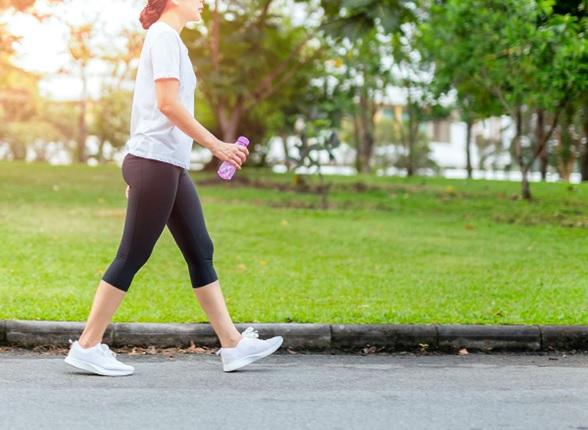
Humans evolved to walk and run long distances. Although we are not as fast as cheetahs, we have better endurance and could outrun them over long periods of time. Unfortunately the majority of us don’t make the most of our natural talents. Most people today spend their time sitting in the car or at a desk. New Zealanders are especially lazy. The average kiwi takes averages a miniscule 4582 steps daily. Although our ability to live without needing to walk far for food is a sign of technological development, it is not very good for our physical health. Walking might be the most underrated activity of all time. Increasing your daily steps is scientifically proven to drastically improve your well-being. If you don’t know all the benefits of walking, you will after reading this.
Fat Loss
Considering one in three New Zealand adults are obese, our activity levels are clearly an area of concern. A lot of us want to drop a few kilos but don’t know where to start. Rather than a fad diet or a hardcore crossfit class, we should literally walk before we run. Increasing your daily steps can make a massive difference to your body fat because it’s a safe and effective way to exercise (especially for obese people). Walking doesn't require any equipment and can be done outdoors or around the house.
Although nutrition is the most important consideration for fat loss, it is not the only factor. Studies show that those who go for walks on top of dieting lose more body fat compared to those who just rely on nutritional interventions. Before you sign up to a gym, start by implementing a daily stroll. Walking is free and doing so increases the number of calories you burn every day. This matters for fat loss because you need to burn more calories than you eat if you want to lose weight. On top of this, research suggests that walking as well as reducing calorie intake will preserve muscle mass. Frequent low intensity exercise is great for our joints and mobility. Walking not only helps us lose weight but also ensures we keep it off for life.

Walk More To Eat More
For those who are a bit more food motivated, increasing your daily steps means your body will require more calories. Food is fuel and inactive people don’t need a lot of it. Just like a car that clocks up a lot of kilometres, those who move around a lot will need more energy to function. Those who want to lose weight will either have to eat less calories or burn more calories (ideally both). Reducing your food intake is not a very exciting prospect. However, increasing your activity is easy to do and means you can eat more food throughout the day. This doesn’t mean you need to earn food through exercise but it is the case that active people need more energy. So if you’re struggling to find motivation to walk, tell yourself that more steps means more food. If this is the only thing that inspires you to stroll then utilise that motivation anyway you can.

Mental Health Benefits
Obviously physical movement is great for your body but walking has psychological benefits too. It is impossible to separate mental health from physical health. We know that moving more has a positive effect on your mood. Research shows that starting your day with a stroll lowers anxiety by decreasing activity in a part of your brain called the amygdala. When you walk through an open space, your eyes dart from side to side and take in your surroundings. This process is known as ‘optic flow’ and has the effect of calming the neurons in your brain. This results in a more chilled out version of you. If you are prone to stress or are a tightly wound person, a morning stroll might be the most optimal method of self care you can practise. Being your best self benefits you and those around you too. Incorporate a morning walk into your routine and notice how much better you feel both physically and mentally.
Creativity
A surprising benefit of walking is that it makes you a more creative person. If you feel like you’ve been lacking inspiration lately, maybe you are one stroll away from your next great idea. Studies show that participants who walked came up with twice as many creative responses compared to those who were stationary. This occurred regardless of whether the person was walking outdoors or inside on a treadmill whilst staring at a blank wall. Potentially this is because when walking we are free from distractions and physical exercise improves cognition. Whatever the reason behind it may be, it is worth giving it a go. Even philosopher Frierich Nietzche said “all truly great thoughts are conceived while walking.” Take a wander and see what ideas you come up with. Not only will your physical health improve but your cognition, job performance and creativity might too.

Social
Walking doesn’t have to be a solo activity. Get some friends together and turn your stroll into a social outing. If you need some incentive to stroll, you could pick a local coffee shop to walk to. Chatting with a friend over a cup of joe is one of life’s greatest pleasures. If you walk while doing it, you won’t even notice the time flying by. Befriend some dog owners and you can even bring their canines too.
Having a buddy to walk with means you are more likely to make these strolls a regular habit. Studies show you are far more likely to follow through with an exercise habit if you have someone keeping you accountable. It is unlikely your friends will turn you down for a leisurely stroll. Ask some mates if they would be keen to make a weekly walk part of their routine. Opting to pound the pavement instead of going to a party will benefit the health of you and your pals too.
How To Start Walking More
Now that we know the benefits of walking, we just need to find ways to do it more often. Think about your daily routine and plan ways to sneak in some steps. You could pace around the house while brushing your teeth. This will guarantee around two minutes of walking at least twice a day. Walking more doesn’t mean going for a planned three kilometre stroll through the park everyday. Sneaking in small bouts of steps every now and then is an effective and achievable tactic.
Another handy tip is to walk every time you need to hydrate when working out. Drinking water is great but if you’re at the gym, leave your bottle at home and walk to the fountain instead. Every time you get thirsty, you will have to do a few steps to go get water. These little increments will tally up. Not only will you be getting a nice rest between sets of weights, you will also be hydrated and moving more.
If you have to take lots of phone calls for work, use this time to get your steps up. Pacing around while on the phone will kill two birds with one stone. You won’t even notice you are exercising because you will be too engrossed with your conversation. This epitomises walking the walk and talking the talk. Pacing every time you get a phone call will quickly become a habit and these small habits add up. If it is a business call you’re taking, then you’re essentially getting paid to improve your health. What a win-win scenario.

One final habit is to say no to the elevator. Take the stairs at every possible opportunity and avoid the temptation to stand still on escalators. It is almost idiotic that people push themselves hard in the gym but turn down easy exercise opportunities throughout the day. Don’t be that person that lazily stands on the escalator. Social influence theory tells us that people will likely copy you if they see you walking up the escalator or opting for the stairs instead. Set the example and be the person that walks up. Not only will you get to your destination faster, you’ll also be improving the health of you and those around you. More time moving during the day means less time you have to force yourself to consciously exercise later. Avoiding the lift is a great way to balance out a sedentary lifestyle and also means you don’t have to put up with annoying elevator music or awkward conversation with strangers.
Conclusion
Unfortunately our modern environment sets us up to live sedentary lives. We tend to wake up, drive to work, sit at a desk and get away with doing minimal physical activity. It doesn’t have to be this way. With a few behavioural adjustments, you can increase your daily steps and reap all the benefits walking has to offer. So what are you waiting for? Get stepping today!
